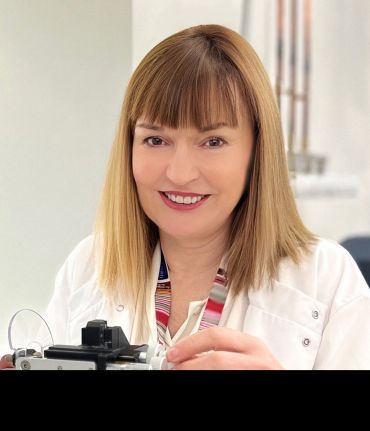Oxford Professor of Chemistry elected to oldest learned US society
Dame Carol Robinson, Dr. Lee’s Professor of Chemistry and Director of the Kavli Institute for Nanoscience Discovery at Oxford University, was honoured for her pioneering work in mass spectrometry techniques for over three decades. Her research has transformed our understanding of the structures and interactions of proteins, including those involved in disease progression.
Professor Robinson said: ‘From Benjamin Franklin to Albert Einstein – the list of APS members is awe-inspiring. Election to this society is recognition of the talents of my research groups over the years, and I am extremely grateful to all of them. Without their dedication and commitment, we would not have been able to achieve any exciting breakthroughs.’
The APS is the oldest learned society in the United States, having been founded in 1743 by Benjamin Franklin for the purpose of ‘promoting useful knowledge.’ It is distinct among learned societies because its membership is composed of distinguished academics from a wide variety of disciplines, including scientists, humanists, social scientists, and leaders in civic and cultural affairs. Since 1900, more than 260 Members have received the Nobel Prize.
Professor Robinson’s work focuses on native mass spectrometry, a technique which enables interactions of proteins to be maintained in the gas phase. This can provide unparalleled information on the structure, binding partners, and dynamics of proteins, complementing other methods yet also being a powerful tool in its own right. Currently, Professor Robinson is developing approaches to link the status of an intact protein receptor or transporter with its changing modifications during disease progression. Ultimately, this could help reveal new potential therapeutic approaches, including for cancer treatment.
These achievements are all the more remarkable given that Professor Robinson left school at 16, took an eight-year career break to have children, and had to forge her career in an overwhelmingly male-dominated world. Her fascination with mass spectrometry began when working as a lab technician with pharmaceutical company Pfizer, where she was encouraged to study a degree at a technical college. After seven years of studying while working full-time, she was awarded a place at Cambridge University to do a PhD, which she completed in two years.
I have always felt very well-supported in my research in the Chemistry Department at Oxford. The department is collegiate, enables ambitious research, and thrives on intellectual freedom. I have enjoyed coming into the department every single day of my career here!
Professor Dame Carol Robinson, Department of Chemistry, Oxford University
After leaving academia to have her children, she took up a post-doctoral position at Oxford University, where she first began using mass spectrometry to analyse protein folding. In 2001, she became the first female Professor of chemistry at Cambridge, and eight years later, accomplished the same historic first at Oxford.
Professor Robinson added: ‘I have always felt very well-supported in my research in the Chemistry Department at Oxford. The department is collegiate, enables ambitious research, and thrives on intellectual freedom. I have enjoyed coming into the department every single day of my career here!’
In 2016, Professor Robinson co-founded a spin-out company, OMass Technologies (now OMass Therapeutics), which uses novel biochemistry techniques, native mass spectrometry, and custom chemistry to develop new drug therapies for immune system and genetic disorders. Five years later, in 2021, she became the first Director of the new Kavli Institute for NanoScience Discovery at Oxford University: an interdisciplinary science institute dedicated to the study of structures and materials on an ultra-small scale.
Her numerous awards and distinctions, include the 2022 Benjamin Franklin Medal in Chemistry, the 2022 Louis Jeantet Prize for Medicine, the European Chemistry Society’s 2021 Gold Medal, the Science History Institute’s 2020 Othmer Gold Medal, the Royal Academy of Belgium’s Academy Prize, and the Royal Society’s 2019 Royal Medal. In 2013, she was appointed as Dame Commander of the Order of the British Empire (DBE) for her contributions to science and industry.

